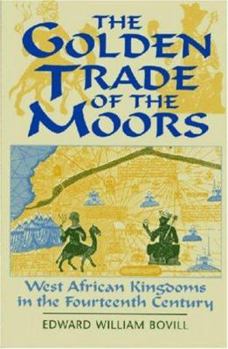The Golden Trade of the Moors: West African Kingdoms in the Fourteenth Century
Select Format
Select Condition 
Book Overview
An account of the golden trade of the Moors, and a source book on Saharan trade routes, caravan organization and Sudanese history. The author covers anthropology and economic geography as well as... This description may be from another edition of this product.
Format:Paperback
Language:English
ISBN:1558760911
ISBN13:9781558760912
Release Date:July 2009
Publisher:Markus Wiener Publishers
Length:332 Pages
Weight:1.00 lbs.
Dimensions:0.8" x 6.0" x 9.0"
Customer Reviews
2 ratings
Reviews for the Golden Trade of the Moors
Published by Thriftbooks.com User , 18 years ago
"Bovill is a gifted teller of tales . . . it is a delightfully written and well-organized account of a vast and neglected field of history . . . a unique source book on Saharan trade routes, caravan organization and Sudanese history. . . . Mr. Bovill not only reveals a firm grasp of history but of anthropology and economic geography." -New York Times "An utterly enthralling, scholarly study . . . very blunt about all the hot little towns, sharp traders and the brutal rulers who figure in this book-but Bovill's truths turn out to be splendidly romantic." -The New Yorker "Bovill writes, as a historian, of the Sahara's golden age, threading his way clearly and with learning through a maze of Berber and Sudanese dynasties. . . ." -Spectator
An easy to read and in depth history of northern Africa
Published by Thriftbooks.com User , 20 years ago
Bovill's THE GOLDEN TRADE OF THE MOORS provides a broad description of the history of North & West Africa from the Tell, the high plateau and the Sahara to the Sahel, and from the Sudan to the bottom of North Africa's hump. Bovill, relying on written history (and some archaeology), traces the history of northern Africa from pre-Carthaginian times to the beginning of the 20th Century. We are introduced to Carthaginian interests in black slaves and Roman trade (and warfare) with the Garamantes, Vandals, Byzantium's involvement in the region and the subsequent Arab conquest and spread of Islam, the rise of Ghana and Mali, the Sanhaja Berber's Islamic puritan dynasty (Almoravids) which spread its control across Northwest Africa and into Muslim Spain before being overthrown by the Almohads (another puritan sect), the Almoravid invasion of Ghana, the rise of Timbuktu, the rise of the Songhai Empire, the (Moroccan) Al-Mansur's rise to power and wealth and the invasion of the Sudan (especially of the Songhai Empire), the increasing independence of the the Berber governors of the Sudan and the growing independence of the Arma (mulattoes), the rise of the Kanem and Bornu and of the Hausa states, the Fulani religious and slave wars and their ultimate demise as the Europeans began to extend their control over the region. Northern Africa, as Bovill tells us, is occupied by both light-skinned and dark-skinned people. The former include the late-coming Arabs and the ancient residents - the Berbers. The Berbers can be sub-divided into the Western tribes of the Botr (including the Zenata who formed the important Marinid dynasty of Morocco), the Branes (including the very powerful Sanhaja peoples), the numerous and widely spread Tuaregs of the central Sahara and a few other tribes. Of these, the first two are westernmost and are generally called Moors (thereby distinguishing them from the more independent Tuaregs and the Moriscos who returned from Spain during and after the Spanish reconquest of al-Andalus). The Tebu, Fezzanese and Haratins and Zhagawas make up the majority of the people of the Sahara who were dark-skinned. Further South, various dark-skinned people from the Wolofs of Senegambia, the Soninke (of ancient Ghana) the Mandingo (of ancient Mali) to the Songhai populated the region. Bovill also introduce us to the famous historian and legalist, Ibn Khaldun and various European and Muslim travelers through the region: Ibn Battuta, Leo Africanus (al-Hassan ibn Muhammad al-Wazzani) and Mungo Park. The mutual importance of the Berbers and Europeans in trade matters is also discussed. The Europeans needed gold (to trade in the East) and slaves from Africa while the Berbers needed military and other goods for local and trans-Saharan warfare as well as silk, spices, sugar and the like. Although the book provides a substantial amount of information, it is sometimes a less than complete history. For example, the rise of t






